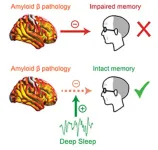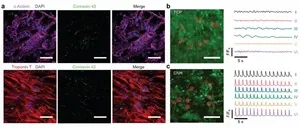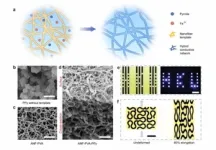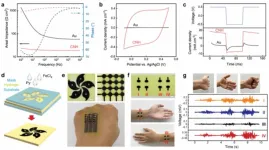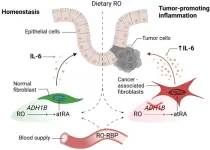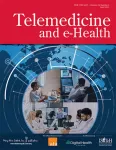(Press-News.org) A deep slumber might help buffer against memory loss for older adults facing a heightened burden of Alzheimer’s disease, new research from the University of California, Berkeley, suggests.
Deep sleep, also known as non-REM slow-wave sleep, can act as a “cognitive reserve factor” that may increase resilience against a protein in the brain called beta-amyloid that is linked to memory loss caused by dementia. Disrupted sleep has previously been associated with faster accumulation of beta-amyloid protein in the brain. However, the new research from a team at UC Berkeley reveals that superior amounts of deep, slow-wave sleep can act as a protective factor against memory decline in those with existing high amounts of Alzheimer’s disease pathology — a potentially significant advance that experts say could help alleviate some of dementia’s most devastating outcomes.
“With a certain level of brain pathology, you're not destined for cognitive symptoms or memory issues,” said Zsófia Zavecz, a postdoctoral researcher at UC Berkeley’s Center for Human Sleep Science. “People should be aware that, despite having a certain level of pathology, there are certain lifestyle factors that will help moderate and decrease the effects.
“One of those factors is sleep and, specifically, deep sleep.”
The research, published Wednesday in the journal BMC Medicine, is the latest in a large body of work aimed at finding a cure for Alzheimer’s disease and preventing it altogether.
As the most prevalent form of dementia, Alzheimer’s disease destroys memory pathways and, in advanced forms, interferes with a person's ability to perform basic daily tasks. Roughly one in nine people over age 65 have the progressive disease — a proportion that is expected to grow rapidly as the baby boomer generation ages.
In recent years, scientists have probed the ways that deposits of beta-amyloid associate with Alzheimer’s disease and how such deposits also affect memory more generally. In addition to sleep being a foundational part of memory retention, the team at UC Berkeley previously discovered that the declining amount of a person’s deep sleep could act as a “crystal ball” to forecast a faster rate of future beta-amyloid buildup in the brain, after which dementia is more likely set in.
Years of education, physical activity and social engagement are widely believed to shore up a person’s resilience to severe brain pathology — essentially keeping the mind sharp, despite the decreased brain health. These are called cognitive reserve factors. However, most of them, such as past years of education or the size of one’s social network, cannot be easily changed or modified retroactively.
That idea of cognitive reserve became a compelling target for sleep researchers, said Matthew Walker, a UC Berkeley professor of neuroscience and psychology and senior author of the study.
“If we believe that sleep is so critical for memory,” Walker said, “could sleep be one of those missing pieces in the explanatory puzzle that would tell us exactly why two people with the same amounts of vicious, severe amyloid pathology have very different memory?”
“If the findings supported the hypothesis, it would be thrilling, because sleep is something we can change,” he added. “It is a modifiable factor.”
To test that question, the researchers recruited 62 older adults from the Berkeley Aging Cohort Study. Participants, who were healthy adults and not diagnosed with dementia, slept in a lab while researchers monitored their sleep waves with an electroencephalography (EEG) machine. Researchers also used a positron emission tomography (PET) scan to measure the amount of beta-amyloid deposits in the participants’ brains. Half of the participants had high amounts of amyloid deposits; the other half did not.
After they slept, the participants completed a memory task involving matching names to faces.
Those with high amounts of beta-amyloid deposits in their brain who also experienced higher levels of deep sleep performed better on the memory test than those with the same amount of deposits but who slept worse. This compensatory boost was limited to the group with amyloid deposits. In the group without pathology, deep sleep had no additional supportive effect on memory, which was understandable as there was no demand for resilience factors in otherwise intact cognitive function.
In other words, deep sleep bent the arrow of cognition upward, blunting the otherwise detrimental effects of beta-amyloid pathology on memory.
In their analysis, the researchers went on to control for other cognitive reserve factors, including education and physical activity, and still sleep demonstrated a marked benefit. This suggests that sleep, independent of these other factors, contributes to salvaging memory function in the face of brain pathology. These new discoveries, they said, indicate the importance of non-REM slow-wave sleep in counteracting some of the memory-impairing effects of beta-amyloid deposits.
Walker likened deep sleep to a rescue effort.
“Think of deep sleep almost like a life raft that keeps memory afloat, rather than memory getting dragged down by the weight of Alzheimer’s disease pathology,” Walker said. “It now seems that deep NREM sleep may be a new, missing piece in the explanatory puzzle of cognitive reserve. This is especially exciting because we can do something about it. There are ways we can improve sleep, even in older adults.”
Chief among those areas for improvement? Stick to a regular sleep schedule, stay mentally and physically active during the day, create a cool and dark sleep environment and minimize things like coffee late in the day and screen time before bed. A warm shower before turning in for the night has also been shown to increase the quality of deep, slow-wave sleep, Zavecz said.
With a small sample size of healthy participants, the study is simply an early step in understanding the precise ways sleep may forestall memory loss and the advance of Alzheimer’s, Zavecz said.
Still, it opens the door for potential longer-term experiments examining sleep-enhancement treatments that could have far-reaching implications.
“One of the advantages of this result is the application to a huge population right above the age of 65,” Zavecz said. “By sleeping better and doing your best to practice good sleep hygiene, which is easy to research online, you can gain the benefit of this compensatory function against this type of Alzheimer’s pathology.”
END
Deep sleep may mitigate Alzheimer’s memory loss, Berkeley research shows
Research published Wednesday from University of California, Berkeley, sleep scientists suggests that deep sleep might help alleviate some of dementia’s most devastating outcomes.
2023-05-04
ELSE PRESS RELEASES FROM THIS DATE:
HKU Mechanical Engineering team develops electroconductive hydrogel for biomedical applications
2023-05-04
Synthetic hydrogels show great promise in tissue repair, drug delivery, medical implants, and many other applications. Hydrogels functionalized with electrically conductive components can be used in bioelectronic devices for cardiac or neural interfaces, for applications such as neural prosthetics, cardiac patches, and electronic skin.
A research team led by Dr Lizhi Xu of the Department of Mechanical Engineering in the Faculty of Engineering at the University of Hong Kong (HKU) has recently developed a new type of electroconductive hydrogels with outstanding mechanical strength and manufacturability, creating ...
New guidance: antibiotics should be halted upon closure of incisions
2023-05-04
ARLINGTON, Va. (May 4, 2023) — Antibiotics administered before and during surgery should be discontinued immediately after a patient’s incision is closed, according to updated recommendations for preventing surgical site infections. Experts found no evidence that continuing antibiotics after a patient’s incision has been closed, even if it has drains, prevents surgical site infections. Continuing antibiotics does increase the patient’s risk of C. difficile infection, which causes severe diarrhea, and ...
Red flags indicate risk for early-onset colorectal cancer
2023-05-04
Researchers at Washington University School of Medicine in St. Louis have identified four important signs and symptoms that signal an elevated risk of early-onset colorectal cancer. These red flags may be key to earlier detection and diagnosis of early-onset colorectal cancer among younger adults. The number of young adults with colorectal cancer has nearly doubled in recent years.
Studying de-identified health insurance data on more than 5,000 patients with early-onset colorectal cancer — cancer that occurs before a person turns 50 — the researchers found that in the period between ...
Reviving exhausted T cells to tackle immunotherapy-resistant cancers
2023-05-04
LA JOLLA, CALIF. – May 03, 2023 – When the cells of our immune system are under constant stress due to cancer or other chronic diseases, the T cells of the immune system shut down in a process called T cell exhaustion. Without active T cells, which kill tumor cells, it’s impossible for our bodies to fight back against cancer. One of the biggest goals of immunotherapy is to reverse T cell exhaustion to boost the immune system’s ability to destroy cancerous cells.
Researchers at Sanford Burnham Prebys studying melanoma have found a new way to make this ...
MD Anderson researchers Helen Piwnica-Worms and Richard Wood elected to National Academy of Sciences
2023-05-03
HOUSTON ― Two researchers from The University of Texas MD Anderson Cancer Center have been elected to the prestigious National Academy of Sciences (NAS). Helen Piwnica-Worms, Ph.D., professor of Experimental Radiation Oncology, and Richard Wood, Ph.D., professor of Epigenetics and Molecular Carcinogenesis, are recognized for their respective contributions to advancing our understanding of cancer genetics, biochemistry and cell biology.
Piwnica-Worms and Wood are among 120 new members ...
Purdue startup Aerovy Mobility develops cloud software to support infrastructure for electric aircraft
2023-05-03
WEST LAFAYETTE, Ind. – The advanced air mobility sector, which includes electric-powered urban and regional aircraft, may become a $1.5 trillion market by 2040. A new Purdue University-connected startup could benefit airport and vertiport operators and real estate developers looking to establish advanced air mobility technology at existing and potential sites.
Purdue University postgraduate students have launched Aerovy Mobility, a startup company that commercializes cloud-based software solutions to plan and operate infrastructure ...
Retinol disruption and the role of vitamin a metabolism in colon cancer
2023-05-03
“Retinoids are known to inhibit tumor-promoting IL-6 production.”
BUFFALO, NY- May 3, 2023 – A new research perspective was published in Oncotarget's Volume 14 on April 26, 2023, entitled, “Disruption of retinol-mediated IL-6 expression in colon cancer-associated fibroblasts: new perspectives on the role of vitamin A metabolism.”
Colon cancer (CRC) is one of the most common malignancies and is a leading cause of cancer-related deaths worldwide. While the tumor microenvironment (TME) supports tumor growth and immune escape through tumor-promoting ...
INRS celebrates the careers of two eminent researchers
2023-05-03
INRS' graduation ceremony will be a wonderful event again this year! In addition to the175 students who will be receiving their master’s or doctorate degrees, two distinguished scholars will be honoured.
During the 2023 ceremony, the Institut national de la recherche scientifique (INRS) is pleased to announce that it will be awarding two honorary doctorates. Researchers Jamal Deen, an expert in electrical engineering and applied physics and a professor at McMaster University, and Mordechai (Moti) Segev, a professor ...
Disparities in telehealth utilization among Medicare beneficiaries
2023-05-03
A new study of telehealth utilization among Medicare beneficiaries in Arkansas showed race/ethnicity and rural/urban disparities. The study, which reported that the association between the number of chronic conditions and telehealth was strongest among White and rural beneficiaries, is published in the peer-reviewed journal Telemedicine and e-Health. Click here to read the article now.
Innovative technologies such as telehealth can improve health care access in underserved areas and in aging populations with growing and complex medical needs. However, the use of telecommunications in clinical settings faces ...
Moffitt researchers develop CAR T cells that fight prostate cancer in bone
2023-05-03
TAMPA, Fla. – Prostate cancer frequently metastasizes to the bone and is incurable. Moffitt Cancer Center researchers are working to identify new treatment options for this subset of patients. In a new article published today in Science Advances, a team of Moffitt scientists demonstrates that chimeric antigen receptor T-cell (CAR T) therapy is an effective antitumor approach in mouse models of bone metastatic prostate cancer.
“Bone metastatic prostate cancer is an incurable disease that significantly impacts patient ...
LAST 30 PRESS RELEASES:
How much sleep do teens get? Six-seven hours.
Patients regain weight rapidly after stopping weight loss drugs – but still keep off a quarter of weight lost
GLP-1 diabetes drugs linked to reduced risk of addiction and substance-related death
Councils face industry legal threats for campaigns warning against wood burning stoves
GLP-1 medications get at the heart of addiction: study
Global trauma study highlights shared learning as interest in whole blood resurges
Almost a third of Gen Z men agree a wife should obey her husband
Trapping light on thermal photodetectors shatters speed records
New review highlights the future of tubular solid oxide fuel cells for clean energy systems
Pig farm ammonia pollution may indirectly accelerate climate warming, new study finds
Modified biochar helps compost retain nitrogen and build richer soil organic matter
First gene regulation clinical trials for epilepsy show promising results
Life-changing drug identified for children with rare epilepsy
Husker researchers collaborate to explore fear of spiders
Mayo Clinic researchers discover hidden brain map that may improve epilepsy care
NYCST announces Round 2 Awards for space technology projects
How the Dobbs decision and abortion restrictions changed where medical students apply to residency programs
Microwave frying can help lower oil content for healthier French fries
In MS, wearable sensors may help identify people at risk of worsening disability
Study: Football associated with nearly one in five brain injuries in youth sports
Machine-learning immune-system analysis study may hold clues to personalized medicine
A promising potential therapeutic strategy for Rett syndrome
How time changes impact public sentiment in the U.S.
Analysis of charred food in pot reveals that prehistoric Europeans had surprisingly complex cuisines
As a whole, LGB+ workers in the NHS do not experience pay gaps compared to their heterosexual colleagues
How cocaine rewires the brain to drive relapse
Mosquito monitoring through sound - implications for AI species recognition
UCLA researchers engineer CAR-T cells to target hard-to-treat solid tumors
New study reveals asynchronous land–ocean responses to ancient ocean anoxia
Ctenophore research points to earlier origins of brain-like structures
[Press-News.org] Deep sleep may mitigate Alzheimer’s memory loss, Berkeley research showsResearch published Wednesday from University of California, Berkeley, sleep scientists suggests that deep sleep might help alleviate some of dementia’s most devastating outcomes.
